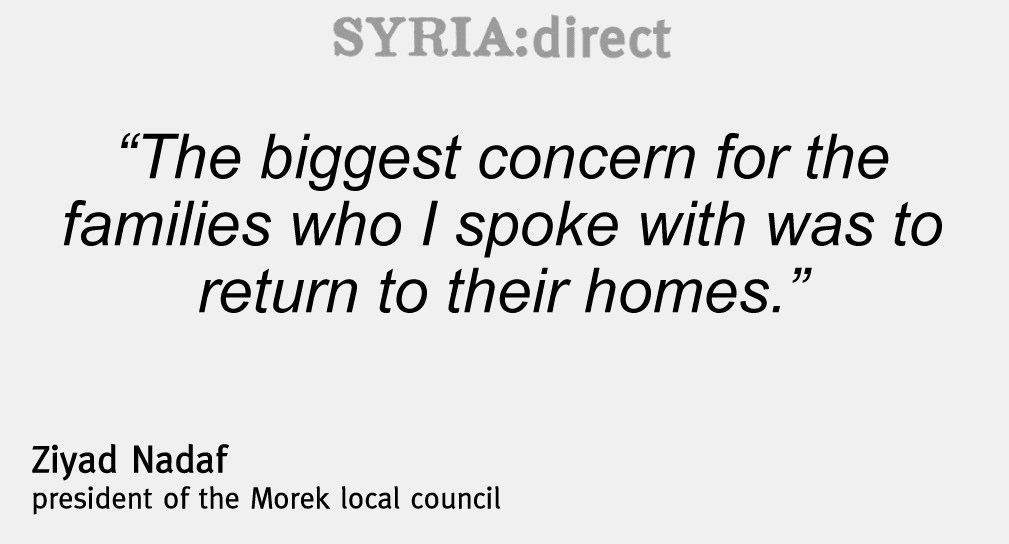Despite new sharia laws, Morek residents ‘want to return home’ after 2 years of displacement
After more than two years of displacement, hundreds of residents […]
9 March 2016
After more than two years of displacement, hundreds of residents of the northern Hama town of Morek are beginning to return to their homes over the weekend in a city almost completely destroyed by years of battle between regime and rebel forces.
The entire civilian population of Morek, around 27,000 people, fled in early 2014, escaping what amounted to a regime ground invasion backed by air strikes. The regime captured the city later in 2014.
Morek matters because it lies on the M5 Hama-Aleppo highway at the entrance to the adjacent northern Hama and southern Idlib countrysides.
After another year of battles, rebel forces led by hardline Islamist brigade Jund al-Aqsa retook Morek in November 2015, Syria Direct reported.
The area remained what rebels called a “military zone” as they cleared mines and other munitions. This past Saturday, Jund al-Aqsa announced in an online statement that displaced residents would be permitted to return on the condition that they abide by “sharia regulations,” including niqabs for women, beards for men and a ban on smoking.
“No restriction, no matter what, would stop them from returning,” Ziyad Nadaf, president of the civilian Morek local council tells Syria Direct’s Alaa a-Nassar.
“People have been returning every day since the announcement, each day more than the one before,” he says.
Q: Have residents returned to Morek after Jund al-Aqsa issued the statement allowing them to do so?
People have been returning every day since the announcement, each day more than the one before. During the day, they clean their destroyed homes and at night a large number return to the areas they fled to [in the nearby Idlib countryside] to sleep, while others remain inside Morek.
Around 50 families have come so far, out of an [original] population of 27,000.

Q: How have residents reacted to Jund al-Aqsa’s stipulations?
The biggest concern for the families who I spoke with was to return to their homes. No restriction, no matter what, would stop them from returning.
These stipulations don’t worry them, and in general the people of Morek are conservative.
Q: When did residents initially flee the city? Why has Jund al-Aqsa only now issued this announcement?
On January 30 2014, all of the residents of Morek were forced to flee because of the regime’s targeting the city with barrel bombs and shelling. People weren’t able to return for two years because of the continuous, grinding battles between rebel factions and the regime.
When Jund al-Aqsa took control, Morek was designated a military zone since it was empty of residents. Over the past five months, they cleared mines and cluster bombs from the town before issuing an announcement [Saturday] calling for residents to return from the 60 locations they fled to in the Idlib and Aleppo countryside.
Q: Is Morek livable after the wide-scale destruction and the long absence of its residents? What arrangements and services have you secured as the local council to support the returning families?
Right now, the city is a pile of rubble, not fit to live in whatsoever. Nevertheless, people have a strong desire to return to the home they were separated from two years ago.
The local council’s task right now is to return all the necessary services and requirements for life, such as water, electricity and sewage.
Over the past two days, the local council and the civil defense directorate have toured Morek to study the possibility of removing rubble from the main street to facilitate movement and transportation within the town.
The local council’s Office of Services has also submitted projects to the [opposition’s] Free Hama Provincial Council and humanitarian organizations to clean, remove rubble and repair two wells, as well as an emergency lighting project and other service and agricultural projects.







